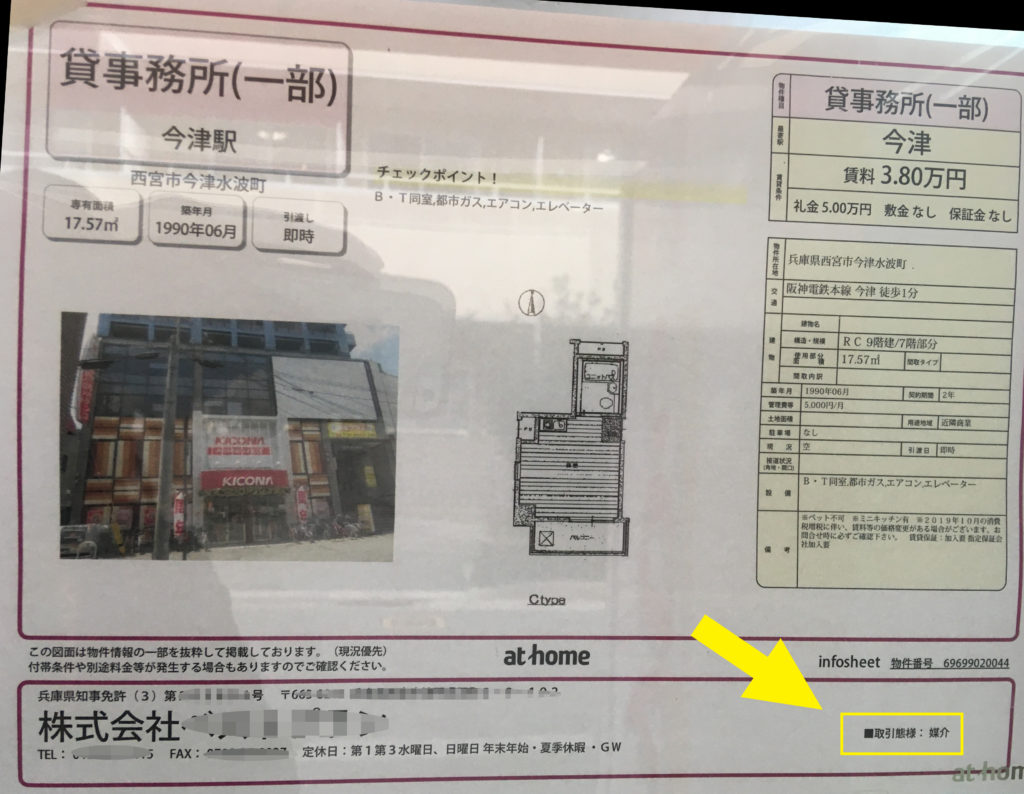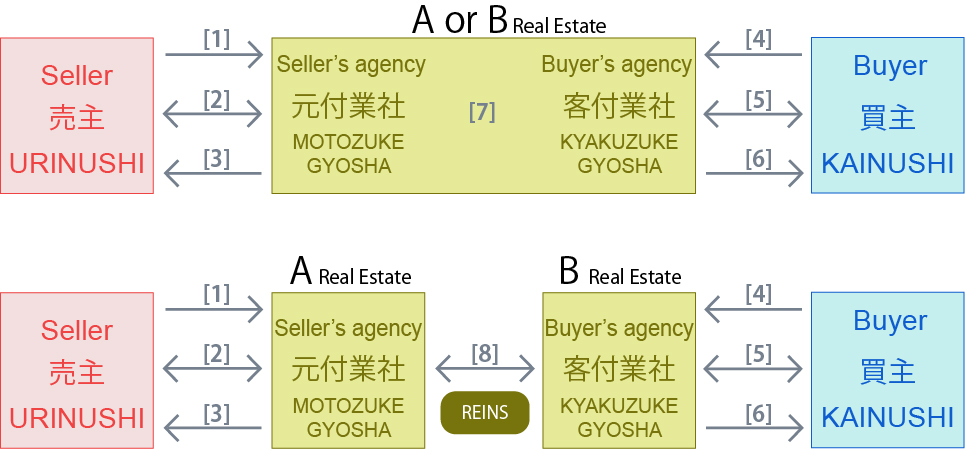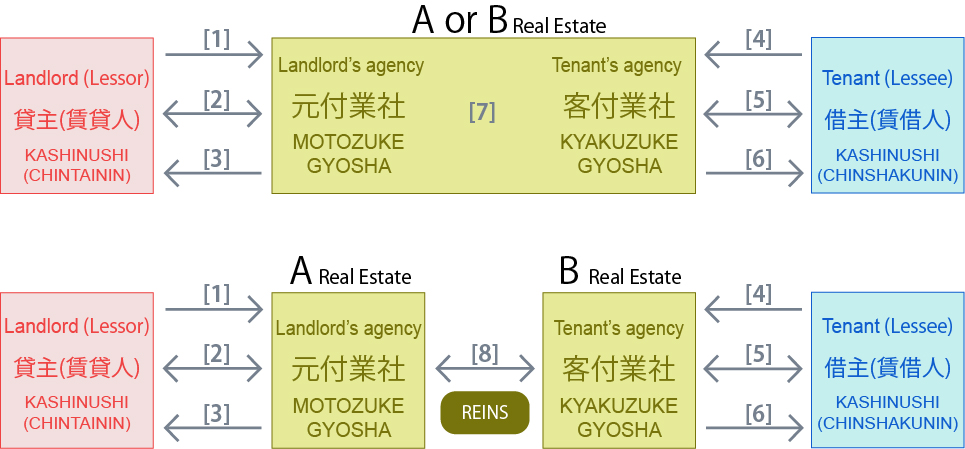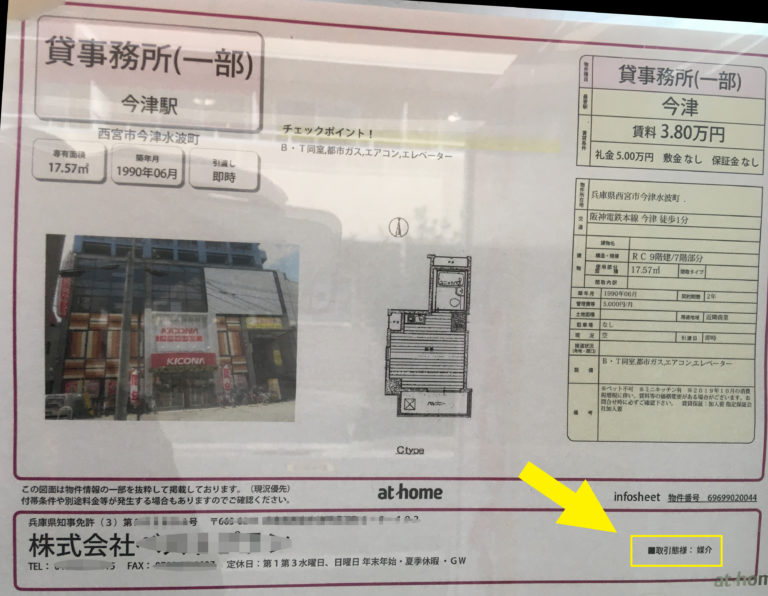You should know the 取引態様 [TORIHIKI TAIYO] (とりひきたいよう) “types of transaction” in advance before buying or renting a property.
Real estate advertisements show how the property will be handled by the real estate company that is advertising it, which is called 取引態様 [TORIHIKI TAIYO] (とりひきたいよう) “types of transaction”

売主 [URINUSHI] (うりぬし) “Seller”
Individuals or corporations selling real estate properties. When a real estate owned by an individual or a corporation is sold, the 取引態様 [TORIHIKI TAIYO] (とりひきたいよう) “transaction type” would be “seller,” and the real estate advertisement is also described as 売主 [URINUSHI] (うりぬし) or 事業主 [JIGYONUSHI] (じぎょうぬし) .
取引態様 : 売主 means that a type of transaction is “Seller”
In this case, a buyer does not have to pay a [仲介手数料] (ちゅうかいてすうりょう) “agent fee” to the seller.
貸主 [KASHINUSHI] (かしぬし) ”Landlord”
Individuals or corporations renting real estate properties. When a real estate owned by an individual or a corporation is rented out, the 取引態様 [TORIHIKI TAIYO] (とりひきたいよう) “transaction type” would be “Landlord,” and the real estate advertisement is also described as 貸主 [KASHINUSHI] (かしぬし).
取引態様 : 貸主 means that a type of transaction is “Landlord”
In this case, a tenant does not have to pay a [仲介手数料] (ちゅうかいてすうりょう) “agent fee” to the landlord.
代理 [DAIRI] (だいり) “Seller’s representative / Landlord’s representative”
Act as an agent for the selling or renting properties and conduct the real estate transaction. The right of representation is obtained from the seller or landlord, and it is possible to deal with it with the same authority as the seller or landlord. Since it is different from 仲介 [CHUKAI] (ちゅうかい), a buyer or a tenant does not have to pay a [仲介手数料] (ちゅうかいてすうりょう) “agent fee” to the Seller’s representative or Landlord’s representative.
仲介=媒介 [CHUKAI=BAIKAI] (ちゅうかい=ばいかい) “Intermediary agent”
In the dealings of real estate, it stands between a seller and a buyer, or a landlord and a tenant, and plays a role to establish the contract of both.
In these cases, a tenant (a buyer) or/and a landlord (a seller) have to pay a [仲介手数料] (ちゅうかいてすうりょう) “agent fee” to the real estate agent.
For a seller or a landlord, there are 3 types of 媒介 [BAIKAI] (ばいかい) in between a seller(landlord) and a seller’s agency (landlord’s agency) [2].
専任媒介契約 [SENNIN BAIKAI KEIYAKU] (せんにんばいかいけいやく) “Exclusive brokerage contract”
– When the client buys, sells and rent out his/her property, he or she enters into a brokerage contract with a real estate agent. In the case of SENNIN BAIKAI KEIYAKU, the client must not make a brokerage contract with any other real estate agents.
– The real estate agent must report to the client once every two weeks.
– The property must be listed on the 不動産流通機構REINS (れいんず) “Real Estate Information Network” within 7 days.
専属専任媒介契約 [SENNZOKU SENNIN BAIKAI] (せんぞくせんにんばいかいけいやく) “Exclusive brokerage contract (more strict)”
– When the client buys, sells and rent out his/her property, he or she enters into a brokerage contract with a real estate agent. In the case of SENZOKU SENNIN BAIKAI KEIYAKU, the client must not make a brokerage contract with any other real estate agents. Besides, even if the client finds a seller or buyer on their own when they sell or buy a property, they must sign the contract through the real estate agent’s intermediary that they have hired.
– The real estate agent must report to the client once every one weeks.
– The property must be listed on the 不動産流通機構REINS (れいんず) “Real Estate Information Network” within 5 days.
一般媒介契約 [IPPAN BAIKAI KEIYAKU] (いっぱんばいかいけいやく)
– When the client buys, sells and rent out his/her property, he or she enters into a brokerage contract with multiple real estate agencies.
– Real estate agents are not obligated to report to the client.
– There is no obligation to list a property on the 不動産流通機構REINS (れいんず) “Real Estate Information Network”.
[For a Seller or a Buyer]

[1] : A Seller ask a real estate agency [Sellers’s agency] to find a buyer
[2] : A Seller signs a brokerage contract which was made by a Seller’s agency.
[3] : A Seller’s agency reports on how many responses there are in the market, how many people have come to view the property, etc.
[4] : A Buyers ask a real estate agency [Buyer’s agency] to find a property for sale
[5] : Generally, a buyer and a real estate agency do not make a brokerage contract in writing.
[6] : Buyer’s agency find some of properties and show them to a buyer
[7] : When a real estate agency receives a request from a seller to act as an intermediary, he or she will also find a buyer on his or her own and try to receive a brokerage fee from both parties.
[8] : A real estate agency register the property on the Real Estate Information Network called REINS (れいんず) within 5 days or 7 days. Once it has been posted on REINS, the property can be viewed by most of all real estate agents throughout the country. It reads to be overwhelmingly easier to find a buyer.
[For a Landlord or a Tenant]

[1] : A Landlord ask a real estate agency to find a Tenant
[2] : A Landlord signs a brokerage contract which was made by a Landlord’s agency.
[3] : A Landlord’s agency reports on how many responses there are in the market, how many people have come to view the property, etc.
[4] : A Tenant ask a real estate agency [= tenant’s agency] to find a property for rent
[5] : Generally, a possible Tenant and a real estate agency do not make a brokerage contract in writing.
[6] : Tenant’s agency find some of properties and show them to a possible Tenant
[7] : When a real estate agency receives a request from a landlord to act as an intermediary, he or she will also find a tenant on his or her own and try to receive a brokerage fee from both parties.
[8] : A real estate agency register the property on the Real Estate Information Network called REINS (れいんず) within 5 days or 7 days. Once it has been posted on REINS, the property can be viewed by most of all real estate agents throughout the country. It reads to be overwhelmingly easier to find a tenant.
仲介=媒介 [CHUKAI=BAIKAI] (ちゅうかい=ばいかい) “Intermediary agent”
仲介 [CHUKAI] (ちゅうかい) is a word that is widely used, and for those who rent or buy a property, when they request a real estate agent, the real estate agency is often called a 仲介業社 [CHUKAI GYOSHA] (ちゅうかいぎょうしゃ) , 仲介会社 [CHUKAI GAISHA] (ちゅうかいがいしゃ), or 客付業社 [KYAKUDUKE GYOSHA] (きゃくづけぎょうしゃ).
*GYOSHA or GAISHA means companies or corporations
*KYAKU means customer
On the other hand 媒介 [BAIKAI] (ばいかい) is a legal term used in the 宅地建物取引業法 [TAKUCHI TATEMONO TORIHIKI GYOHO] (たくちたてものとりひきぎょうほう) ”Building Lots and Buildings Transaction Business Law”, and when the owner of a property requests a real estate agency to act as an intermediary, the real estate agency is often referred to as 媒介業社 [BAIKAI GYOSHA] (ちゅうかいぎょうしゃ) , 媒介会社 [BAIKAI GAISHA] (ばいかいがいしゃ), or 元付業社 [MOTODUKE GYOSHA] (もとづけぎょうしゃ).

